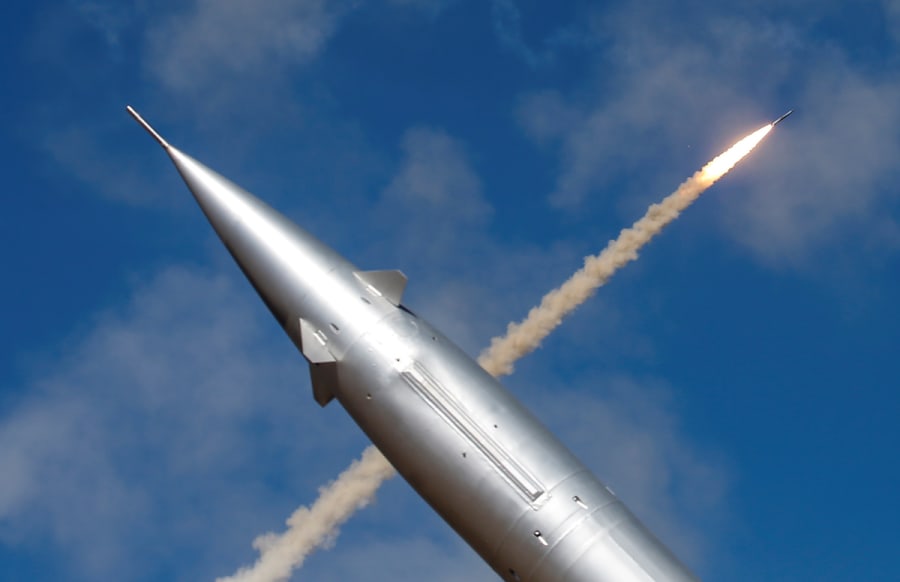In a first, Russian forces fire anti-aircraft missiles at Israeli fighter jets in Syria
The incident, if confirmed, could signal a dangerous shift in Russia’s policy toward Israel in Syria

Russian forces reportedly fired S-300 anti-aircraft missiles at Israeli Air Force jets for the first time during airstrikes in northwestern Syria on Friday night, according to Israel's Channel 13.
The Syrian military reportedly also used its air defense system to fire anti-aircraft missiles at the IAF jets.
The anti-aircraft missiles missed their targets because their radar reportedly did not manage to lock onto the Israeli jets in time. But the incident, if confirmed, could signal a dangerous shift in Russia’s policy toward Israel in Syria and a potential threat to Israel’s future bombing campaigns in the country.
The Channel 13 report said it was not immediately clear if the missile fire was a one-time event or a Russian signal to Israel that the status quo in Syria could be changing.
The airstrikes took place near the city of Masyaf in the Hama countryside and reportedly targeted an underground facility, which was destroyed. According to the UK-based Syrian Observatory for Human Rights, the IAF fired at least eight missiles that struck weapons depots and sites belonging to Iranian militias in the area, which has been repeatedly targeted by Israel in recent years. At least five people were killed and seven hurt in the attack, according to Syria’s state news agency.
Israel is believed to be behind large numbers of bombing raids inside Syria in recent years in an attempt to target weapons shipments bound for Hezbollah, the Iranian proxy terrorist organization in Lebanon and other Iranian-linked sites. Israeli authorities rarely discuss the air raids in Syria publicly – known as the “war between wars” – and did not confirm the raid or the S-300 incident. However, Defense Minister Benny Gantz, may have hinted at the attack in statements on Monday when he said that Israel will prevent Iran from moving weapons and other “advanced capabilities” to pro-Iranian forces in the region.
“The State of Israel will continue to act against any enemy that threatens it, and prevent the transfer of advanced capabilities from Iran that endanger the citizens of Israel and harm the stability of the entire region,” Gantz said during a visit to the military’s Northern Command.
Moreover, he confirmed for the first time that Hamas, the Gaza-based Iranian-backed terrorist organization, now also operates out of Lebanon.
In comments made Tuesday during a visit to Israel's Reichman University, Gantz said that Iran is using Syria to spread its weapons to terrorist proxies in the region.
“Iranian proxies are attacking oil reserves, airports and civilian facilities. Iran itself is conducting attacks via its Quds Force. It is developing operational systems throughout the region, equipped with accurate capabilities including cruise missiles, surface-to-surface missiles and UAVs, capable of reaching thousands of kilometers,” Gantz said.
Gantz also said that Iran had sought to provide weapons to Palestinian terrorist groups in Gaza and the West Bank in February.
“The quantity of strategic weapons in the hands of Iranian proxies has increased significantly in the last year: In Iraq there are hundreds of weapons, in Yemen the number has also increased and the Houthis hold dozens of weapons,” Gantz said.
Gantz also discussed the “attempted use” of a pair of Iranian drones in February.
“Among other things, based on the fact that the UAVs had parachutes attached, we estimate that the purpose of the launch was to deliver weapons to terrorist organizations in Gaza or in Judea and Samaria,” he said. “The mission failed, and the UAVs were intercepted in Iraq. In Syria, too, attempts continue to be made to transfer and produce accurate weapons. Israel will continue to thwart these efforts and face any threat to its citizens and the region.”

The All Israel News Staff is a team of journalists in Israel.














